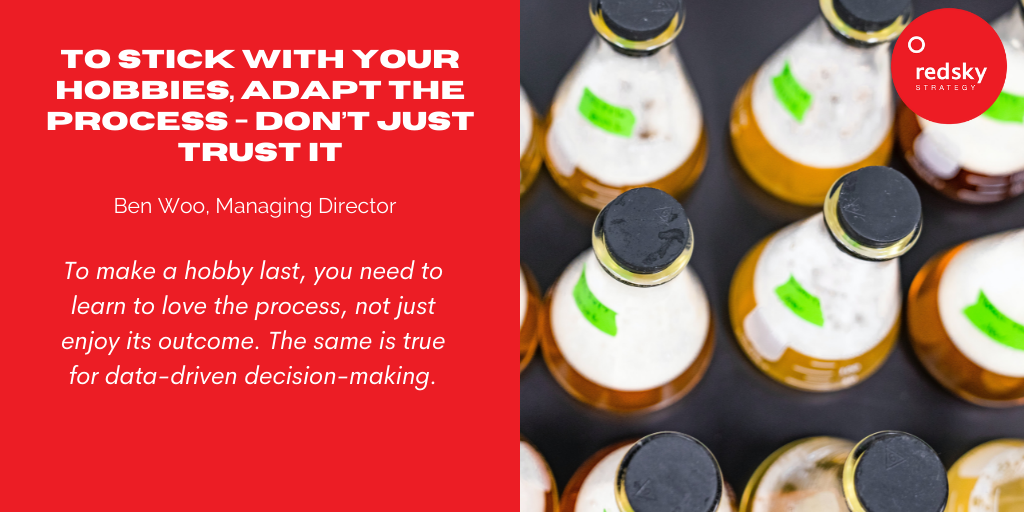News
To Stick With Your Hobbies, Adapt the Process – Don’t Just Trust It

Image Credit: https://unsplash.com/photos/BnePwPa2ciU
We’re roughly two years into one of the greatest hobby booms in modern times. Did you, like nearly 60% of Americans during the pandemic, pick up a new activity or hobby? Perhaps you vowed to commit to a new routine or learn a new skill? Which, if any, have you stuck with?
“Pandemic hobbies” stuck for some people. LendingTree research found that nearly 80% of consumers say they plan to continue with their hobby post-pandemic, and the majority have done so.
However, this isn’t always the case. Another study commissioned by the British Heart Foundation revealed that most hobbies have a shelf-life of about 16 months.
There’s an underappreciated wellness benefit of sticking to the process and being disciplined in your initiatives. Research published by the National Library of Medicine has shown that leisure activities and hobbies are associated with better physical and mental well-being.
The LendingTree survey discovered that nearly half of consumers who started a new hobby during the pandemic, such as photography or coding, turned it into a side hustle to earn money. One-third of participants said they aimed to improve their mental health.
However, figuring out how to stick to your hobbies can be challenging. To make a hobby last, you need to learn to love the process, not just enjoy its outcome.
Customize the Boilerplate to Fit Your Needs, Resources, and Environment
As someone who’s been brewing Kombucha for 5+ years now, I had to learn to love the process. Although I’d been cooking creatively and often aggressively for 15 years, I’ve resisted baking. The inability to taste test and improvise has scared me off.
My kombucha brewing hobby kicked off with a hand-me-down starter batch that I got from a friend just north of San Diego. He and I often traded notes on Lacto fermentation (aka old-school pickling), and he insisted that kombucha was just as straightforward: tea, sugar, and juice instead of veggies, salt, and water.
My friend’s straightforward instructions and copy of Sandor Katz’s basic kombucha recipe helped me get started, but I had to adapt it to a process that I could sustain. I followed it diligently once or twice, but that’s how long I had the patience for. Perfect works once or twice or in the real world, but good enough can be good enough forever.
For example, I lost my coworking-space-provided supply of tea bags (which his recipe used), so now I use bulk loose leaf tea ordered online. Repeating the brewing process every 10 days wasn’t realistic for my schedule, so I do a 14-day (2-week) primary fermentation instead. In order to slow down the fermentation a bit, I keep it in a cooler space – in a cupboard as opposed to on top of the kitchen refrigerator. These adaptations made the whole process much more repeatable.
Find What Works for You and Iterate on Themes
Many hobbies with staying power involve processes we enjoy, not just outcomes we aim for. Once you find a process that works for you, you can get creative with it and innovate by iterating on themes.
For example, I found that the best kombucha batches were brewed with around 60 grams of sugar in the secondary fermentation. That measurement allowed me to explore other natural sweeteners in that amount, leading me to safely experiment beyond juices with higher-potency ones like maple syrup and molasses. Dialing in these amounts then enabled me to play around with additional natural flavors like ginger (with maple) and vanilla (with molasses).
There are many companies iterating themes of health and wellness. Let’s take the beverage industry, for example. So many beverages out there have been demonized. Consumers want to find something delicious and healthy enough so they don’t feel guilty consuming it. Consider how Coca-Cola bought sparkling water brand Topo Chico.
While the top-selling beverage is still water, many new options have taken center stage. Kombucha has quickly become a healthy alternative to soda. There’s also been an uptick in waters with additives, such as VitaminWater, and flavors.
Learn What Is a Must and Where Flexibility Is Available
If you’re pursuing a new hobby or passion, it’s important to determine what your necessities are and where there is room for flexibility. This can be particularly crucial when it comes to your finances.
LendingTree research found that 53% of consumers who picked up a new hobby in the pandemic took on credit card debt. Some attributed it as the feeling of needing to “spend money to make money”. More specifically, nearly half of those who found themselves in debt said they wanted to invest in special equipment. Nearly 40% said debt was their only way to afford the hobby, and about 20% got ahead of themselves with excitement that they went a little overboard.
Fresh-squeezed juice is great for brewing kombucha. However, it’s not great for my wallet, my schedule, or my kitchen’s cleanliness. I still make and use it every now and then, like when my neighbor’s fruit trees are ripe and I have someone else to do the fresh squeezing. But, I have found that 100% pure single-fruit bottled juice is fine, and there’s always one or two good flavors on sale at my local market.
It’s smart to factor in your finances and identify possible expenses you can cut back on in order to invest more into your hobby or passion project. Consider the resources and tools available for free at your disposal, such as online videos and tutorials. If there are certain products or equipment needed, explore options for renting or borrowing.
Accept the Inevitability of Mistakes
Another essential aspect of learning to stick to a hobby and reap the benefits is accepting that there will be minor or even explosive mistakes along the way. It’s good to have high expectations of yourself.
However, being too critical or hard on yourself and not allowing yourself room to make mistakes can lead to unnecessary frustration and stress. Not only can it be counterproductive to the positive health benefits you can gain from your hobby or leisure activity, but it can also result in premature abandonment of your hobby.
Like any kombucha brewer, I have had a few explosions. One was the result of attempting a strawberry pie kombucha made using a strawberry puree. It turns out that purees lead to explosions, and this one required mopping the ceiling. Not a mistake I’ve made twice!
Mistakes are important data points. View obstacles you encounter as learning opportunities that will ultimately help you improve and succeed.
Chop Wood, Carry Water
“Chop wood, carry water” is a well-known zen quote. While its exact origin hasn’t been definitively traced, it has multiple interpretations and variations attached to it that essentially emphasize the importance of being present and mindful both in work and in life. A longer iteration of the quote is, “Before enlightenment; chop wood, carry water. After enlightenment; chop wood, carry water.”
This concept is applicable to “trusting the process” and sticking to the routine of a new hobby for the long term. The overarching idea is that when you learn to become more mindful and accepting of the daily routine and mundane tasks required for developing a disciplined practice, the process becomes easier and, ultimately, rewarding.
For me, kombucha brewing lent structure to my weeks and weekends. As someone who spends most of his workday typing and clicking and talking, it’s nice to have a manual hands-on activity to repeat when thinking of nothing else. So, kombucha brewing has brought me not only probiotics and reduced alcohol/sugar intake, but also weekend time management and hands-on mindfulness.
A robust process carried out routinely can provide fringe benefits. The same is true for data-driven decision-making in business. The processes of hypothesis generation, data collection, strategic analysis, and implication prioritization improve interdisciplinary alignment and collaboration.
Interested in working with RedSky Strategy? We look forward to hearing from you to learn how we can help illuminate meaningful insights into your brand strategy.
